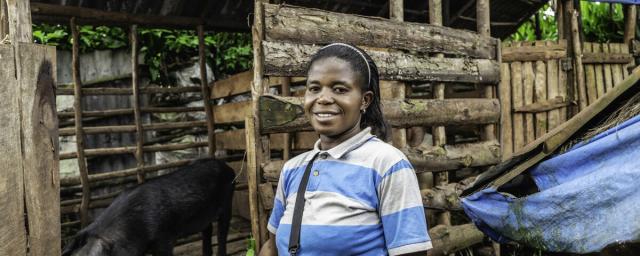
Marie N'simire, mother of two living in Tshazi, trader and farmer participating in the Oxfam BMZ project having received a pig, seeds, and agricultural tools. She is the leader of women participants and a farmer in Tshazi Lurhala. (Photo: Narcisse K Chibangu/Oxfam)
The Democratic Republic of the Congo (DRC) is the largest country in Sub-Saharan Africa. The country has a population of over 100 million and faces a high level of inequality. The country experiences significant challenges related to poverty, food insecurity, and health issues. Oxfam plays a crucial role in addressing these issues, instigating humanitarian, development, and advocacy initiatives.
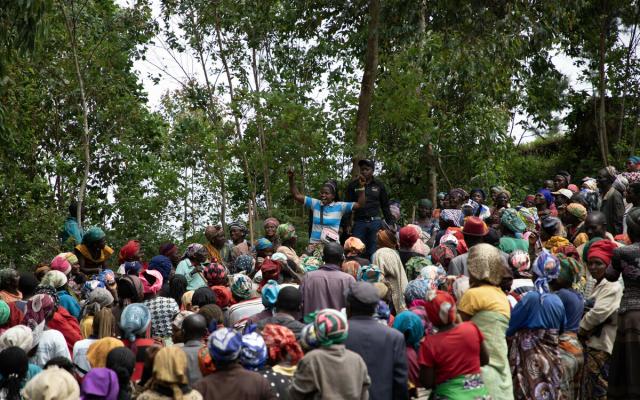
Marie Nsimire, Farmer and Participant of the BMZ project, talking to women of her community about the work that has happened so far. (Narcisse K Chibangu/Oxfam)
Challenges
The DRC is grappling with severe humanitarian and development-related challenges. Prolonged conflicts have led to widespread violence, creating one of the largest humanitarian crises globally. Approximately 27 million people need humanitarian assistance, facing acute food insecurity exacerbated by climate shocks and economic instability.
Access to basic services such as healthcare and education remains limited, particularly in rural areas. Opportunities exist in strengthening local governance, enhancing community resilience, and promoting agricultural development to improve food security.
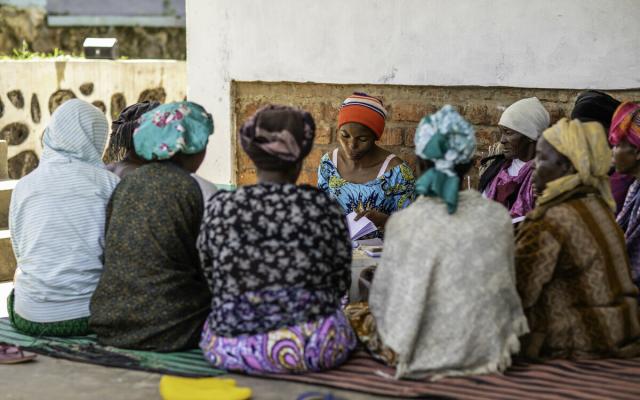
Murega Bahat leads a money collection session for the A.V.E.C savings group in Burhinyi chiefdom, South Kivu, DRC. (Photo: Narcisse K Chibangu/Oxfam)
Impact on People
Displacement leads to loss of livelihoods and access to essential services, exacerbating poverty and food insecurity. Children suffer from disrupted education and increased risks of exploitation and abuse. Women face heightened vulnerabilities, including limited economic opportunity and gender-based violence, further entrenching cycles of inequality and hardship.
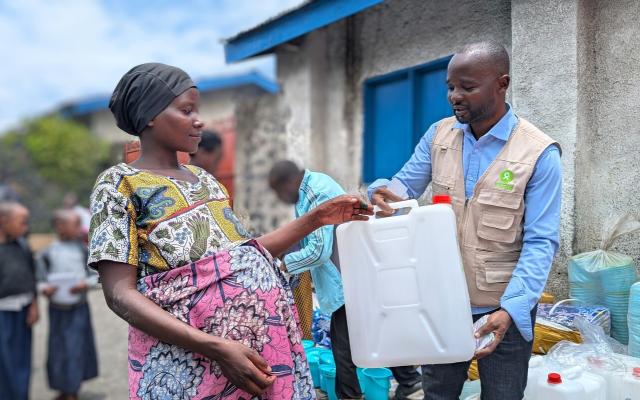
Muhawe Myriam Charmante receiving Non-Food Item kits from Oxfam staff. (Photo: Yves Kalwira/Oxfam)
Oxfam’s Role
Oxfam started operations in DRC in 1961. We continue to prioritize water, sanitation, and hygiene (WASH), food security, and protection. By collaborating with local partners and communities, we aim to strengthen resilience and support individuals to advocate for their rights. Oxfam’s integrated approach combines immediate assistance with sustainable development strategies, positioning us to leverage opportunities for growth while responding to urgent needs.
Our Work
Our vision is a DRC where women and men have a greater capacity to make their voices heard in policies and decisions that affect them, benefit from a responsible government, and access resources to enable them to improve their quality of life.
Life-saving assistance
Playing a leading role as a national humanitarian actor, Oxfam provides time-efficient, high-quality humanitarian assistance to Congolese people affected by crises. We provide clean water, sanitation services, and emergency food to approximately 700,000 people, including internally displaced individuals, refugees, and host communities.
Sustainable access to water and good hygiene
Oxfam is providing long-term access to clean drinking water and enabling communities and schools to create their own local schemes to manage and maintain water and sanitation facilities. Together with other organizations we also equip communities with public health and hygiene education to help curb the spread of deadly diseases.
Gender justice
Gender justice and gender equality are integrated into all Oxfam programs in the DRC. We work with women's communities and women's rights organizations to ensure that our programs contribute to behavioral change and support women to participate in decisions that affect their families and communities.
Protection
Over the years, Oxfam has supported communities in organizing themselves into committees capable of identifying and addressing protection threats through self-protection mechanisms and advocacy. This approach also encourages local authorities to uphold their duty to protect civilian populations.
Livelihoods
Oxfam is helping local farmers grow crops such as cassava, coffee, beans, and soya, which are more resistant to diseases and help ensure a regular food supply. We are also supporting them to work together in farmers’ groups, where they can share knowledge on good agricultural practices, including crop planning and budgeting. Through these groups, they are able to access larger markets where they can sell their produce at better prices.
Good governance
Linked to the Protection program, our governance-based approach emphasizes on the facilitation of positive dialogue between local populations and civilian and military authorities. We prioritize the social advancement of women and support citizens with the knowledge of human rights, confidence, and skills to take action to remedies for abuses.
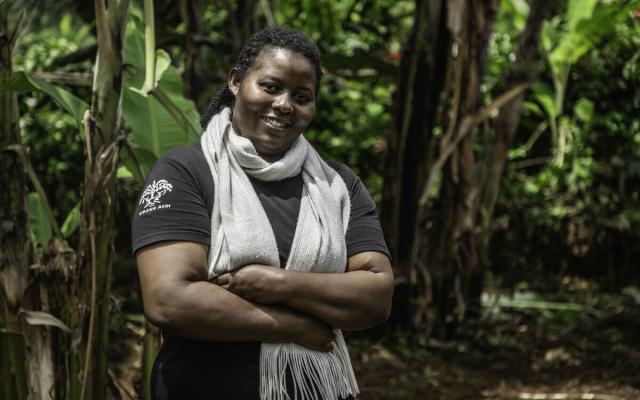
Nelly Migane is an agronomist and focal point at SIKASH (Le Syndicat d’Initiative de KASHA) in the Oxfam BMZ program. She supports the community of women participants in the Kabare territory, precisely in Tshibinda and Katana. (Photo: Narcisse K Chibangu/Oxfam)
Looking Ahead
Work is needed on access to education and healthcare for marginalized groups, strengthening local governance mechanisms, and enhancing funding for food security and protection programs. Promoting economic opportunities for women will be essential in reducing poverty and inequality, contributing to a more resilient futures for people in DRC.